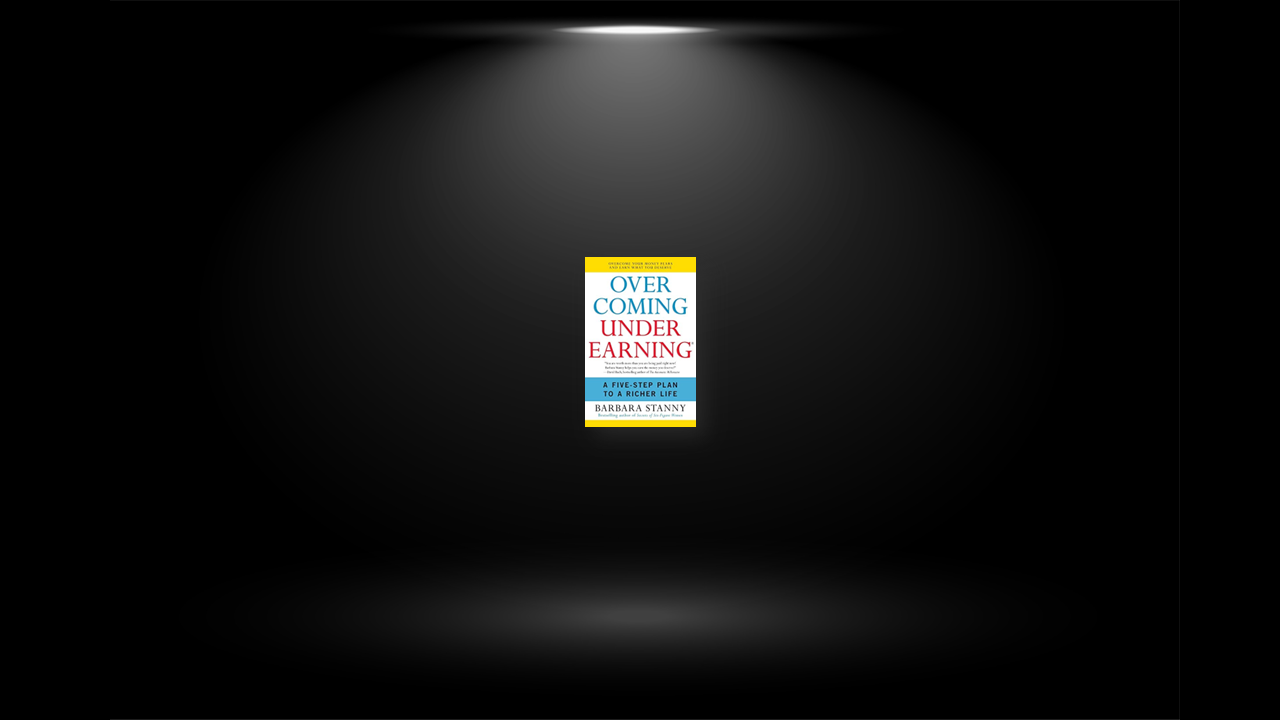Are You an Underearner?
DEFINITION OF UNDEREARNER: One who earns less than her potential despite her need or desire to do otherwise.
UNDEREARNING is not the same as VOLUNTARY SIMPLICITY, which is a conscious choice to live on less in order to create a simpler, saner life. An UNDEREARNER is not the same as A MINDFUL LOW EARNER, someone who enjoys her work because it feeds her soul and also provides adequate income.
Underearning is a condition of DEPRIVATION in which your emotional and/or physical needs are not being met. Underearning is rarely a conscious choice. It never leads to a saner or more satisfying life. It always involves self-denial—not only of money, but time, freedom, impact, and joy; denial of your value, your power, your needs, and your options.
TEN TRAITS OF UNDEREARNERS
- Underearners talk as if they’re trapped. 2. Underearners give their power away. 3. Underearners underestimate their worth. 4. Underearners crave comfort. 5. Underearners are self-saboteurs. 6. Underearners are codependent. 7. Underearners live in financial chaos. 8. Underearners are vague about money and success. 9. Underearners are anti-wealth. 10. Underearners are controlled by fear.
Did you happen to notice what these ten traits all have in common? Every one of them is self-imposed. Every one is something we do to ourselves. Go back and reread each trait. Can you see how every one is the result of a choice we made? That’s wonderful news. If we create the conditions for underearning to occur, we have the power to change them. Or as Barbara Christenson put it, “I saw underearning wasn’t an out-of-control thing. Underearning was my responsibility.”
Step 1: Tell the Truth
The first step to overcoming underearning—telling the truth —means being honest about your financial situation and exploring your beliefs and attitudes around money.
The place to start is by identifying tangible problems, facing them head on, even when there’s no solution in sight. You also need to do the Inner Work, figuring out how your early programming and limiting beliefs have restricted your earning potential. You may get angry at your past choices, and doubt your ability to change, but eventually you’ll realize how much power you have to create the life you deserve.
Step 2: Make a Decision
The second step is making a decision, or declaring a profit motive. You don’t need a plan in place. A decision is like a magnet. It’ll draw opportunities to you.
If you’re stuck, it may be the Grand Conundrum, the internal battle between what you say you want and what you really want. The solution: make a new decision congruent with your spoken goals and start living according to your values. Three things will happen when you make a firm decision: coincidences, changes in other areas of your life, and resistance. Take advantage of the coincidences; don’t let other changes throw you; and make sure the resistance doesn’t stop you.
Step 3: Stretch
The third step, the stretch, requires you to take action, to enter the Discomfort Zone, to face your fears.
To overcome underearning, you actually must seek out opportunities to stretch, to do what you think you can’t do. You enter the Discomfort Zone every time you. Do something unfamiliar. Speak up and ask for what you want. Let go of what’s holding you back. The payoff is not only higher earnings, but, more important, higher self-esteem.
Step 4: Create Community
The fourth step, create a supportive community, is especially important to underearners who tend to operate in isolation or hang out with naysayers.
The people you’re with on a regular basis significantly affect your ability to succeed. Four kinds of support are particularly important: True Believers who cheer you on. Confidantes who you can confide in. Way Showers who model what’s possible. Messengers who provide information.
How do you find supportive people? Realize no one will do this for you, but you don’t have to do it alone. Reach out and ask for help. Hang out with the kind of people you want to be like, not who you’ve been. Recognize the role of the naysayer. Watch what you talk about. Respect yourself by taking time for you.
Step 5: Respect and Appreciate Money
The fifth step, respect and appreciate money, ensures that you make a good living and enjoy a good life.
It’s critical to take care of your finances by following the Four Rules of Money: Spend Less, Save More, Invest Wisely, and Give Generously…in that order. Above all, you must stop debting and start paying off your credit cards. Cutting back doesn’t mean cutting out buying completely. Instead, track your expenses, do a spending plan, and educate yourself financially.
Getting smart about money requires traveling through the four phases of the Learning Curve (Unconscious Incompetence; Conscious Incompetence; Unconscious Competence; Conscious Competence). The First Law of Investing: never put money in anything you don’t understand. Your biggest risk is not market volatility, but making uninformed choices or doing nothing at all.
Call to Action
There’s a story about a snail climbing a cherry tree in the middle of winter. A beetle looks down, spies the snail slowly inching up the frozen bark, and cries out, “There ain’t no cherries up here.” Unfazed, the snail replies, “There will be by the time I get there.”
That little snail is a stellar example of the Game Plan for Overcoming Underearning. Think big. Act small. And never, ever stop until you attain your goal, no matter what. Overcoming underearning doesn’t happen overnight. It’s a gradual process of faithfully following the Five-Step Plan until it becomes a way of life.
Tell the truth about what’s not working, and what is. Make a firm decision about what you truly want. Look for opportunities to stretch by doing what you think you can’t do. Surround yourself with a supportive community. Respect and appreciate money by taking good care of it.
These steps are not something you can read about and forget. You really must make them part of your daily routine, because if you do something every day, no matter how small, no matter how brief, you will eventually arrive at your destination.


